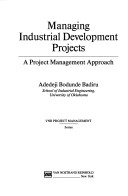VNR project management
1 total work
Conventional public management techniques in industrial management projects are often insufficient because they cannot respond or adapt to the dynamism of modern and global markets. This guide shows how to overcome these problems by using project management techniques that expedite industrial development in regional, national, and global settings. Using real-world examples and a systems approach, the author provides a project management model that accounts for all critical interfaces in industrial development projects. He explores every aspect of project planning and organization, as well as cultural and human resource issues. Key areas discussed include how to: * Schedule and control projects* Conduct and evaluate project feasibility studies* Select a project manager and staff the project* Secure the best experts for various project functions* Expedite transfer of industrial technology from developed to developing nations Coverage of budgeting and cash-flow analysis promotes understanding of the cost aspects of projects. Readers are shown how to use the Critical Path Method and Program Evaluation and Review Techniques to streamline project scheduling.
They also find out how to use learning curve analysis to evaluate project performance. Guidelines on managing multinational projects are supplemented with case studies that illustrate successful industrial development in different countries. Appendices list numerous research, industrial, and economic resources, as well as United Nations information sources. Managing Industrial Development Projects paves the way for successful outcomes in countries that need them most. It is a valuable reference for practitioners, public administrators, and national policy makers, as well as students in industrial engineering, industrial administration, engineering management, and public administration programs.
They also find out how to use learning curve analysis to evaluate project performance. Guidelines on managing multinational projects are supplemented with case studies that illustrate successful industrial development in different countries. Appendices list numerous research, industrial, and economic resources, as well as United Nations information sources. Managing Industrial Development Projects paves the way for successful outcomes in countries that need them most. It is a valuable reference for practitioners, public administrators, and national policy makers, as well as students in industrial engineering, industrial administration, engineering management, and public administration programs.
